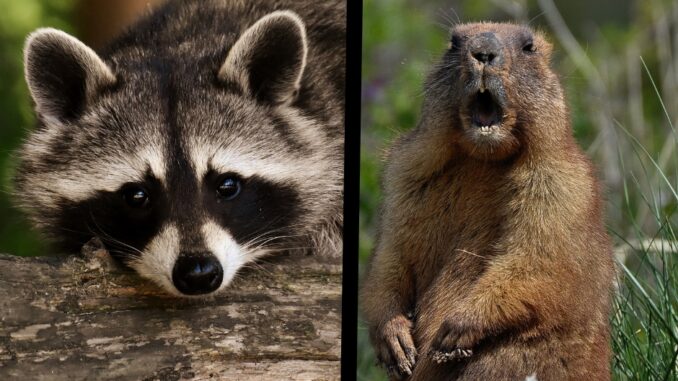
Curious about whether raccoons and groundhogs get along? Raccoons and groundhogs typically coexist in shared spaces, but their relationship is more marked by cautious coexistence than friendship. Raccoons, being opportunistic predators, may pose a potential threat to groundhogs, especially their young, influencing a dynamic of avoidance rather than cooperation.
Table of Contents
Do raccoons and groundhogs get along?
Raccoons, by nature, are solitary animals, and they don’t form close bonds even within their own species. Their opportunistic behavior is driven by a constant search for food and suitable shelter. While raccoons may share territories with other wildlife, they don’t don’t get along with anyone.
In shared habitats, raccoons and groundhogs often coexist due to the overlapping nature of their territories, especially in suburban and urban environments where green spaces and human settlements intersect. However, the dynamics of their relationship are more defined by a certain level of competition rather than mutual cooperation.
Raccoons, known for their adaptability and opportunistic foraging behavior, occasionally exploit groundhog burrows for various reasons. This could involve searching for food, such as groundhog young and even utilizing abandoned burrows for shelter. Raccoons are skilled climbers and scavengers, and their nocturnal habits contribute to their ability to navigate and explore various habitats.
On the other hand, groundhogs, with their herbivorous diet and burrow-digging capabilities, inadvertently attract raccoons due to the availability of food resources or potential shelter in their burrows. However, groundhogs are not known for being particularly territorial or aggressive towards other species, so their interactions with raccoons are often more passive than confrontational.
Do raccoons and groundhogs live together?
Raccoons and groundhogs may share the same living spaces, but they don’t live together harmoniously. Raccoons, being opportunistic predators, can pose a threat to groundhogs, particularly their young. Groundhogs tend to avoid raccoons to minimize potential conflicts.
Do raccoons eat groundhogs?
Yes, raccoons are opportunistic predators and may eat groundhogs, especially their young, if the opportunity arises. Raccoons are opportunistic omnivores with a varied diet that includes small mammals, birds, insects, fruits, and vegetables. While groundhogs are primarily herbivores, raccoons may opportunistically prey on them.
Raccoons are skilled climbers and can access groundhog burrows or habitats, making them potential predators.
Groundhog vs Raccoon – Who will win a fight?
In a confrontation between a raccoon and a groundhog, the raccoon is likely to have the upper hand. Raccoons are more agile, equipped with sharp claws and teeth, and have a varied diet that includes small animals. Their opportunistic and predatory nature gives them an advantage in physical confrontations compared to groundhogs, which are primarily herbivores and rely more on digging as a defense mechanism.
Frequently Asked Questions (FAQs) About Raccoons and Groundhogs Interaction
Q1: Are groundhogs afraid of raccoons?
A: Yes, groundhogs often exhibit a fear response towards raccoons. Raccoons, being opportunistic predators, may pose a threat to groundhogs, especially their young. Groundhogs are generally cautious and may actively avoid raccoons to minimize potential conflicts.
Q2: Do raccoons kill groundhogs?
A: Raccoons, known for their opportunistic hunting behavior, may prey on groundhogs, particularly their young, if the opportunity arises. While raccoons and groundhogs may share the same living spaces, the interactions are not always harmonious, and raccoons may view groundhogs as potential sources of food.
Q3: How do groundhogs typically respond to the presence of raccoons in their vicinity?
A: Groundhogs often respond to the presence of raccoons by exhibiting cautious behavior. Being aware of raccoons’ opportunistic and predatory nature, groundhogs may retreat to their burrows or adopt defensive postures to minimize the risk of encounters.
Q4: Can groundhogs and raccoons cohabitate peacefully in the same area?
A: While groundhogs and raccoons may share the same living spaces, their cohabitation is not characterized by peaceful interactions. Raccoons’ predatory tendencies and groundhogs’ cautious nature often lead to an avoidance strategy, minimizing direct confrontations between the two species.
Q5: Are there instances of groundhogs defending themselves successfully against raccoon threats?
A: Groundhogs possess strong digging abilities and may use their burrows as a primary defense against raccoon threats. While groundhogs generally avoid direct confrontations, they may rely on their burrows to escape or create a barrier, showcasing their adaptive strategies for self-defense.
Conclusion:
The interaction between raccoons and groundhogs is characterized by a dynamic blend of cautious coexistence and occasional conflicts. While both species may share common habitats, their differing behaviors, with raccoons being opportunistic predators and groundhogs displaying defensive strategies, shape their relationship. Groundhogs, wary of potential threats from raccoons, often adopt avoidance measures.
The complexities of these interactions highlight the intricate balance of nature, where each species adapts to its surroundings, contributing to the diversity and resilience of ecosystems in urban and wild environments alike.
